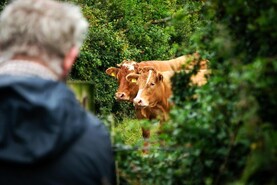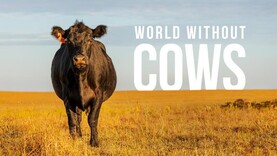Last week Alltech’s One Vision conference drew nearly 3,000 attendees from around the world for a three-day event highlighting future challenges and opportunities for the sector. Despite diverse areas of expertise, speakers tied their unique experiences and successes into business advice and a vision for the future of agri-business.
Speakers included former president and CEO of Ford Alan Mulally, Apple co-founder Steve Wozniac and John Calipari, head coach of University of Kentucky’s men’s basketball team.
While Mulally stressed the importance of breaking down silos and creating an inclusive culture, Calipari talked about his “one and done” philosophy that is about staying in the moment and the importance of “trying stuff but remembering to fail fast”.
Below are some of the highlights from the conference.
Water wars
Jomi Bernad Blanch of Alltech said while there is no shortage of water on Earth, less than 1% of the world’s water supply is available as freshwater for growing crops, industrial use and consumer use.
In terms of volume, agriculture uses the most freshwater (70%) of these three sectors.
Best-selling author Seth Siegel said at the conference: “It’s not impossible that the wars of the 21st century will be fought over water.” He said that eight of the states in the US are in drought. By 2025, there are estimates that 40 states will suffer a similar fate.
Siegel uses Israel as an example and says it is one of the most arid places on Earth. But he says Israel has an abundance of water.
Not only does it irrigate its own land, but it also provides 50% of its water to Gaza and to Jordan.
Surprisingly, Israel is also a global agricultural exporter.
Siegel says this is possible thanks to new technologies such as seeds bred to thrive in drought conditions and on salty water.
They also desalinate their water, converting saltwater into freshwater.
Solar is the new oil and wind
Ramez Naam from Singularity University said solar energy is the future and that it makes wind look slow. He said that as the cost of both its energy capture and storage is steadily decreasing, it is becoming the cheapest source of energy in many parts of the world.
New contracts in the US for solar are now costing US3.6c per kilowatt hour (kwh) and that in Dubai it has now fallen to under 3c/kwh.
He said the amount of oil we use per person has plunged as society becomes more efficient over time.
In perhaps his strongest statement on the changing energy markets, he said: “The stone age didn’t end because of a lack of stone, and the oil age will not end because of a lack of oil”.
While oil has recovered from its sub $30/barrel to $50/barrel, it is hard to see it recovering to anywhere near $100/barrel. While there is a direct benefit with regard to fuel, energy and fertiliser costs, low oil inevitably is not good for agriculture. Low oil prices mean ethanol from crops is less competitive and pushes more grain to feed. This in turn weakens grain prices, which fuels dairy production in many countries. Furthermore, demand from oil rich nations for dairy and food products is reduced due to the low incomes from low oil.
Local food the route to premium
Rebecca Noble, Alltech said “Food and nutrition is now seen as a gateway to health and that consumer decisions are now based on beliefs that go far beyond cost and convenience.” She added that 25% of consumers are willing to pay a premium for products that are “all natural, GMO-free, gluten-free and organic”. She said that the organic category continues to be the largest segment for attracting premiums in store aisles. In 2014, organic sales in the US reached $40bn, and global sales are projected to reach $1trillion by next year. She added that sales of foods grown locally could eclipse sales of organic food and that supermarkets are aggressively expanding and marketing their locally grown offerings for sale. Consumers continue to want to know more about the way in which their food is produced, explained Noble. She said that retailers are educating shoppers to producers’ management and land practices, water use, farm safety and energy consumption.
How do you make your competition irrelevant?
Damien McLoughlin, Smurfit Business School, discussed finding a strategy for differentiation. “What is it that you can do to make your competition irrelevant?” asked McLoughlin. He gave many reasons why he believes competition is more intense right now as a direct result of the advance in technology. He said that today, all of the power is with the buyer.
To overcome this he explained a company needs to create uncontested market spaces, make the competition irrelevant, create and capture new demand, break the idea of value-cost trade-off, and align the whole system of a firm’s activity in pursuit of differentiation and low cost.
He said that the core principle is value innovation, which simply put is to find ways to reduce cost.
Future technologies
Facial recognition for cows
Cainthus is an Irish technology company that has developed facial recognition software for dairy farms that can memorise the face of a cow in six seconds and monitor the activity of an entire herd without wearable tracking devices. It can alert a farmer when cows show early signs of lameness or how they feed.
Scouting fields with drones
Self-flying drones are already very successful for monitoring crop growth. However, current drones are disruptive for use in animal agriculture and will not be fully effective until they are small enough to go unnoticed by animals or can fly high enough that they won’t be seen.
Robotics to drive polyculture
Robotic harvesters could allow farming to return to polyculture, the practice of growing multiple crops side by side in the same field. In contrast to monoculture, polyculture is closer to the natural ecosystem, which can result in better soil health and easier pest management.
Digitising agricultural decisions
Digitising agriculture will allow farmers to make decisions based on data rather than emotion or hype. There will be a need to base decisions on what is happening on a farmers own farm and not anecdotal evidence from another farm, even the one next door.






 This is a subscriber-only article
This is a subscriber-only article










SHARING OPTIONS: